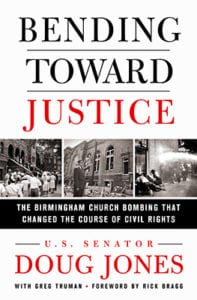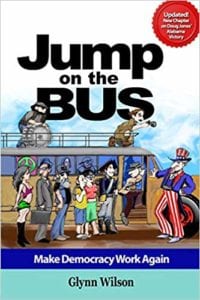Bending Toward Justice: The Birmingham Church Bombing that Changed the Course of Civil Rights, by Doug Jones, All Points Books, a division of St. Martin’s Press and MacMillan Books.
Book Review –
By Glynn Wilson –
The inspiration for the title of Doug Jones’ emotional, inspiring and detailed account of the legal cases that brought two Ku Klux Klansmen to justice for the horrendous bombing of the 16th Street Baptist Church in Birmingham, Alabama, so many years after the violent incident exploded onto the world scene, is a partial quotation used by Martin Luther King, Jr. back in his day: “…the arc of the moral universe is long, but it bends toward justice.”
Politicians would later take up the phrase, most famously President Barack Obama, who had it woven into a rug displayed in the White House.
It seems worth remembering, however, that it was American Transcendentalist, reformist Unitarian minister and slavery abolitionist Theodore Parker who first coined the phrase, and even King used it in the long-term theological sense, only holding out some fleeting hope that something like justice might one day come down like water overtopping a dam on a river during our mortal time on earth.
To be alive and in the room to see a real, concrete instance of justice delivered — like the jury verdicts in the cold murder cases against KKK members Thomas Blanton Jr. and Bobby Frank Cherry for killing the 14-year-olds Addie Mae Collins, Cynthia Wesley, Carole Robertson and 11-year-old Carol Denise McNair way back in September, 1963 — is a rare and incredible thing to be a part of and to actually see in person.
For Mr. Jones, now a United States Senator and a U.S. Attorney when he led the prosecution of those cases, a thing like that can change your life — and whet your appetite to be involved in bringing about more justice and change, if you can find a way.
As I was reading through and remembering all the gory details of the bombing and learning all the legal details of the cases, much of which might only be of keen interest to people from Birmingham, Alabama or who have placed themselves on the front lines of the still ongoing civil rights movement, a word that is not in the book kept popping into my head. I had to keep pushing it out of the way to keep my eyes and mind going through the story, telling myself to look it up later.
Mr. Jones describes how difficult it was to work through old evidence boxes and antiquated tapes, to track down old witnesses and convince them to testify, and to painstakingly piece together solid legal cases against the unapologetic bigots who perpetrated one of the most despicable and infamous racist crimes of the 1960s — and then to get a judge to allow evidence in and get all the relevant facts in front of a jury.
Overcoming Inertia
The word that kept coming to mind was “inertia,” and how hard it is to overcome this force in the universe to make something happen or bring about change.
In physics, inertia is the term used to describe the phenomenon of “resistance” surrounding any physical object to any change in its velocity, including speed or direction. More technically, it is a property of matter when it exists in a state of rest or uniform motion. Inertia does not change and cannot be overcome — unless pressure is applied by an external force.
A rocket would never make it off the ground and into space without enough fuel to overcome inertia, as well as gravity.
Inertia comes from the Latin word iners, meaning idle or sluggish. It is one of the primary manifestations of mass, which is a quantitative property of physical systems. Isaac Newton defined inertia as his first law of motion in Philosophiæ Naturalis Principia Mathematica.
“The vis insita, or innate force of matter, is a power of resisting by which every body, as much as in it lies, endeavours to preserve its present state, whether it be of rest or of moving uniformly forward in a straight line.”
Inertia in the Social Realm
In the social science realm, inertia can be used as a noun and described as “a tendency to do nothing or to remain unchanged.” One example is “the bureaucratic inertia of government.” But it also applies to how hard it is to bring about change in a society hellbent on not changing, in clinging to the past as hard as it can hold on.
It takes an incredible external force to overcome the inertia to bring about change. That’s the source of the frustration often felt by activists, journalists and pioneers of new technology alike who are convinced that if they could only apply enough pressure, positive change would inevitably come about.
The cases described in this book demonstrate that the arc of the moral universe can show itself in real time, like a rainbow appearing in the sky when the sun comes out after a summer rain.
Consilience
As I was thinking more about this example of how inertia was overcome, I thought of another related concept that applies in these cases, expressed in the word “consilience,” which is something another Alabama writer, E.O. Wilson, has talked about in terms of how science and the social sciences and humanities might not be so separated and apart as we might think. Consilience also applies to the practice of law, in that evidence from independent, unrelated sources can “converge” on strong conclusions to help a jury reach a verdict.
Much of the evidence in the cases against Blanton and Cherry might have been old and “circumstantial.” But when woven into a picture puzzle as it was presented to the jury, or in a coherent narrative as we often try to produce in journalism to frame things in a way that might chip away at the inertia and bring about a change in the current consensus of public opinion, the facts can be made to converge to bring about a change in the direction of public policy.
In science, when multiple sources of evidence come into agreement, like all the studies showing definitively that our climate is changing due to global warming from the burning of fossil fuels, the conclusion can be very strong, even when none of the individual sources happen to be statistically significantly on their own. Most established scientific knowledge is supported by a convergence of evidence. That often takes a very long time, however, and requires overcoming the inertia of a standing scientific paradigm.
The same is true in social movements, which are prima facie designed to bring about change in the conventional wisdom of the time. This is made even harder when the forces of inertia are stridently supported by political and communications systems that owe their financial success to propping up the existing status quo. Think President Donald Trump and today’s Republican Party in the U.S. being supported by conservative talk radio, Fox News and online alt-right news outlets such as Breitbart News.
Even the mainstream economically objective press and broadcast media play their own role in protecting the existing order by keeping the dominant narrative alive and resisting any radical changes in the story line. This is further compounded to some extent even by the computer algorithms that exist today for the dominant social media outlets of this time, mainly Facebook and Twitter.
Forcing Change
For change to come about fast enough, to overcome the inertia we face today, it will take forces even stronger and larger than the movement put together in 2017 to elect Doug Jones over Roy Moore, and to elect enough Democrats in 2018 to take over the House.
In his opening Forward to the book, my old friend Rick Bragg, the former New York Times feature writer and Alabama author, harkened back to Harper Lee’s American classic To Kill a Mockingbird to set the scene for Doug Jones’s story. He said the author “conjures a modest country lawyer from imagination and memory, from pieces of her own father, and set him against Southern society itself, against prejudice and meanness and the petrified opinions of a doomed but lingering ideal.”
I would not call it an ideal, and it was not necessarily doomed, but it was the forces of inertia at work. He has a point of bringing up Atticus Finch, who was a fictional character, “just a name in a story.”
“Men did their evil across the decades and just got away with it, while good men stood by and did nothing.”
Bragg was there that day, the day the gavel came down on Bobby Frank Cherry in the second trial in May, 2002, and so was I.
It was Doug Jones and his team and that judge and jury that put in the time, the effort, and applied the pressure to show us that old, powerful, bigoted inertia could in fact be overcome. He showed us, and this book long in the making tells the story, that the arc of the moral universe could be illuminated right before our very eyes, like that rainbow after a storm.
Bending Steel
It shows us that sometimes, when the forces of the universe align just right and enough pressure is applied in the right direction, justice can be bent into place like a hot rod of steel in the forges of the U.S. Steel mill in Birmingham, Alabama, where Jones once worked for a brief enough stint to convince him to pursue an education and a more white collar future. It takes a lot of heat and pressure to forge steel into the shape of a truck.
It also takes a lot of heat and pressure to try an old, cold case and get a conviction.
It takes a lot of heat and pressure to elect a Democrat to the U.S. Senate from the conservative red state of Alabama, seemingly home to the god of inertia himself, when every national and local news outlet and most of the pundits said it couldn’t be done.
That could have made a great ending to this book. But it doesn’t stop there.
I suspect like myself, Mr. Jones now has such an appetite for bringing about justice and change that he is not done yet. There’s way more work left to do, and not that much time left to get it done.
He, and I, could use more help to keep heating things up and applying the necessary pressure to keep bringing about change in this state and country. Maybe if you read this book, it will fire you up to get onboard the opportunity bus and be a part of something big.
You too could be there in that room the next time we see the arc of the moral universe show up like a rainbow, and be involved to watch it roll down like water over the dam of inertia and spring free. What have you got to lose but the weight of the past on your shoulders?
—
Call to Action
Donate to the Doug Jones reelection campaign here.
Share all these links on Facebook and Twitter.
Also buy editor and publisher Glynn Wilson’s book here,
with a new chapter on how Doug Jones prevailed over Roy Moore in the special election of 2017.















